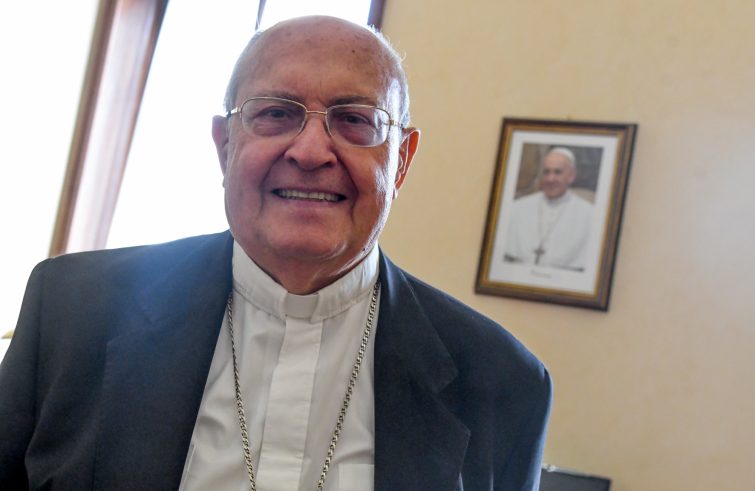
Card. Sandri, at last a Pope in Iraq, in the land of Abraham…
Pope Francis’ visit to Iraq marks the fulfilment of John Paul II’s dream of going on pilgrimage to Iraq, to Ur of the Chaldeans, birthplace of Abraham, father of the three monotheistic religions (Judaism, Christianity and Islam). It was his dream to bring together the believers of the three Abrahamic faiths to pave the way for a new world based on fraternity, peace and justice, respect for human rights and specifically religious freedom, thus guaranteeing peaceful coexistence for all. Pope Francis will be coming as an ambassador of peace and hope, to bear witness to the possibility of a new world without violence and hate.
 The agenda of the visit – with the theme “You are all brothers” – envisages a meeting with the clergy, religious and catechists in the Syriac Catholic Cathedral of Our Lady of Salvation in Baghdad on 5 March – after the welcome and official greetings with Iraqi authorities – a symbolic site for the local Church as it was here that 48 Iraqi martyrs were killed in a terrorist attack on 31 October 2010…
The agenda of the visit – with the theme “You are all brothers” – envisages a meeting with the clergy, religious and catechists in the Syriac Catholic Cathedral of Our Lady of Salvation in Baghdad on 5 March – after the welcome and official greetings with Iraqi authorities – a symbolic site for the local Church as it was here that 48 Iraqi martyrs were killed in a terrorist attack on 31 October 2010…
The Iraqi Catholic community, in its various denominations, has been severely affected by war, terrorism and the inhuman violence committed by the Islamic State. This cathedral epitomises the martyrdom of Iraqi Christians, it symbolises, exemplifies the countless sufferings and stories that ended with sacrifice for Christ and the Church. Therefore, the decision to pay homage to the victims of the attack – carried out a week after the end of the Synod for the Middle East (10-24 October 2010) convened by Benedict XVI – is of great significance. The attack took its toll on the project to build a new Church rooted in communion and witness. The Pope will pay homage to those martyrs – including men, women, children, old people, families – not least to remind the world that faith in Christ can sometimes require a calling to martyrdom.
Your Eminence, in December 2012 you consecrated the cathedral, rebuilt after the attack. What are your thoughts as you prepare to return with Pope Francis?
It will be a very touching experience. I returned two years after the attack for the reconsecration, and many renovation works had been completed, including the crypt with the monument to the martyrs. Returning with Pope Francis entails a deeper experience of the martyrdom of today’s Christians, sadly a reality of many world countries.
 Pope Francis’ journey will see two highly significant dialogue events that are eagerly anticipated for their future implications: the courtesy visit to the Grand Ayatollah Sayyid Ali Al-Husayni Al-Sistani in Najaf and the inter-religious meeting at the plain of Ur of the Chaldeans, homeland of Abraham….
Pope Francis’ journey will see two highly significant dialogue events that are eagerly anticipated for their future implications: the courtesy visit to the Grand Ayatollah Sayyid Ali Al-Husayni Al-Sistani in Najaf and the inter-religious meeting at the plain of Ur of the Chaldeans, homeland of Abraham….
The implied message of these two meetings extends beyond Iraqi borders. Francis’ meeting in Najaf with Shiite cleric Grand Ayatollah Ali al-Sistani, inevitably draws our attention to the meeting in Abu Dhabi with the Grand Sunni Imam of Al-Azhar, Aḥmad Muḥammad Aḥmad al-Ṭayyib. The meeting in Najaf will underscore human brotherhood that transcends any and all religious differences, rooted for us in the human being created in God’s image and likeness. The children of Abraham – Christians, Jews and Muslims – profess their faith in one God, which constitutes a uniting bond.
In your opinion, could the meeting with Shia cleric Al-Sistani be the first step on a path comparable to that with Al-Azhar, and perhaps result in a document similar to the Abu Dhabi Declaration?
This is in the hands of God. Developments are hard to predict. We call on the whole Church to pray intensely for the success of this journey. By success I mean success in charity, faith and fraternity with all. Indeed, the opportunity to meet and be together is in itself a door that opens to the future. May it bear fruits like those that blossomed with the Abu Dhabi Declaration.
Pope Francis will be the first Roman pontiff to celebrate Mass in the Chaldean rite. What is the significance of this gesture?
This is a gesture of ultra benevolence on behalf of the Holy Father to the Chaldean Church that underwent great suffering and will now receive the universal shepherd of the Catholic Church. It is Peter coming to confirm the Chaldean Iraqi Church in the faith.
 Sunday March 7 will mark another eventful day: the Pope will be in Kurdistan, in Mosul, the Iraqi martyred city that the Islamic State designated as its capital, and in Qaraqosh, in the Nineveh Plains, that in 2014 saw a mass exodus of Christians due to Islamic State militias. Holy Mass celebrated at the sports Stadium in Erbil is the concluding event of the day. A day devoted to encounter and with the Iraqi church…
Sunday March 7 will mark another eventful day: the Pope will be in Kurdistan, in Mosul, the Iraqi martyred city that the Islamic State designated as its capital, and in Qaraqosh, in the Nineveh Plains, that in 2014 saw a mass exodus of Christians due to Islamic State militias. Holy Mass celebrated at the sports Stadium in Erbil is the concluding event of the day. A day devoted to encounter and with the Iraqi church…
It will somewhat be the day of the disciples of Emmaus: like Jesus with the disciples, the Pope will be journeying with the local Church to sites once home to countless faithful, Mosul, Qaraqosh, the Nineveh Plains. It will be a day of communion with Iraqi Christians, a meeting amidst the ruins of the war that still causes suffering and unhealed wounds.
What are your hopes for this visit, which – let us remember – takes place just a few days after the ten-year mark (15 March 2011) of the war in neighbouring Syria?
It will be a visit of consolation and a seal imprinted on the Iraqi Catholic Church after all the sufferings it has endured. It will simultaneously serve as a strong exhortation to the clergy, religious and laity to strengthen the bonds of unity, communion and witness. Bearing Christian witness is most effective and credible when it is expressed in service and love for all. The Pope often turns his thoughts to the sufferings of the Middle East. The Syrian war has entered its 10th year. The Pope’s words in Iraq will be a precious balm also for Syria, for Lebanon and for the entire Middle East. The Pope has often said that it is impossible to imagine the Middle East without Christians. We therefore pray that Pope Francis may bring our Christian brothers and sisters in Iraq and the Middle East a balm of peace, serenity and renewed zeal to bear witness to Christ.











